Vanderbilt University’s chancellor whines in email to students at $58,000-a-year college after it drops in US News rankings because it is private – as students mock their own school’s ‘rich privilege’
Vanderbilt University leaders blasted US university rankings after it fell five places to 18th due to ‘numerous flaws’ in methodology – while students mocked ‘wealthy privilege’ school.
Chancellor Daniel Diermeier and Provost C. Cybele Raver of the $58,130-a-year private university in Tennessee sent an email to alumni criticizing the latest rankings, saying removing traditional factors was the reason for the school’s demotion.
This year, U.S. News placed more emphasis on social mobility and included factors such as first-generation graduation rates and graduation rates of Pell Grant recipients.
They eliminated factors that examine the proportion of graduates who borrowed federal loans, high school class rank, alumni giving rate, terminal faculty and class size.
The chancellor’s message, however, did not go down well with many Vanderbilt students, who called the reaction “embarrassing.”
Vanderbilt University ranks 18th in the national college rankings and first in the state of Tennessee.
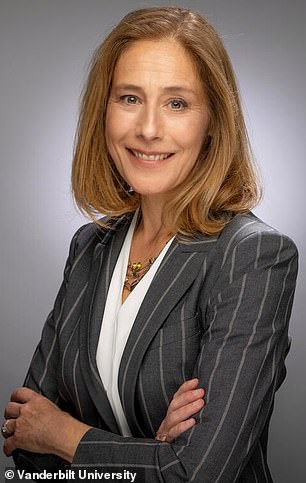
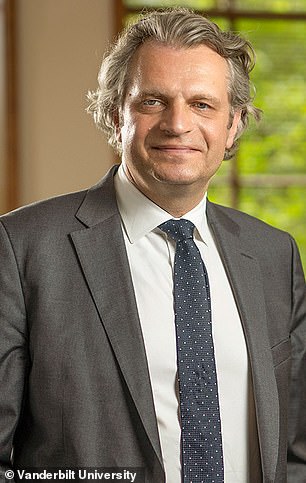
The chancellor and dean of Vanderbilt University wrote an email to the community in response to the lower ranking.
The email to the Vanderbilt community blamed the suppression of factors such as “faculty with the highest possible credentials in their field” and “the percentage of incoming students who are in the top 10 percent of their high school class.”
“The change in U.S. News methodology led to a dramatic shift in the overall rankings, disadvantaging many private research universities while favoring large public institutions,” they wrote.
“To take just a few examples, the University of Chicago moved from sixth to twelfth place. Dartmouth is down six. Berkeley and UCLA moved up five spots, placing themselves tied for 15th. UNC moves up seven spots to 22nd.
“(…) Specifically, US News has made significant methodological changes that reduce emphasis on metrics that ensure faculty and student quality, while placing more emphasis on social mobility, which it measurement using incomplete and misleading data.
“Measuring social mobility is of course an important consideration. Vanderbilt is deeply committed to providing access to qualified students from all backgrounds through our Opportunity Vanderbilt financial aid program and more.
“But it is deeply misleading to mix this policy concern with measures of education quality,” the email continues.
“As a research university, it is particularly distressing to see the incompetence and lack of rigor that increasingly characterizes U.S. News rankings, and it is deeply disturbing that many families continue to rely on them for one of the most important decisions of their lives. the lives of families.
According to Vanderbilt’s website, the university has an endowment of $10.25 billion. While the university has fallen in the national rankings, Vanderbilt is at the top of the list for the state of Tennessee.
Some students took to the internet to mock the chancellor’s email, calling the notes “rich privilege.”
On X, formerly Twitter, a user shared a meme expressing that the university would rather blame the poor than improve the school in response to the ranking drop.
Another wrote: “I guess when you’ve spent so many years and such exorbitant amounts of money as alumni to work your way to the top of these rankings, losing even a few places really stings!”
“The fact that Vanderbilt’s chancellor abandoned an email response due to student and faculty outrage at moving from 13th to 18th in the US News rankings is so embarrassing,” shared another user.
A Vanderbilt student known only as Jen on TikTok said, “Maybe you should ask yourself why, with your eight billion dollar endowment, you haven’t figured out how to accept the poor and enroll them in school.”
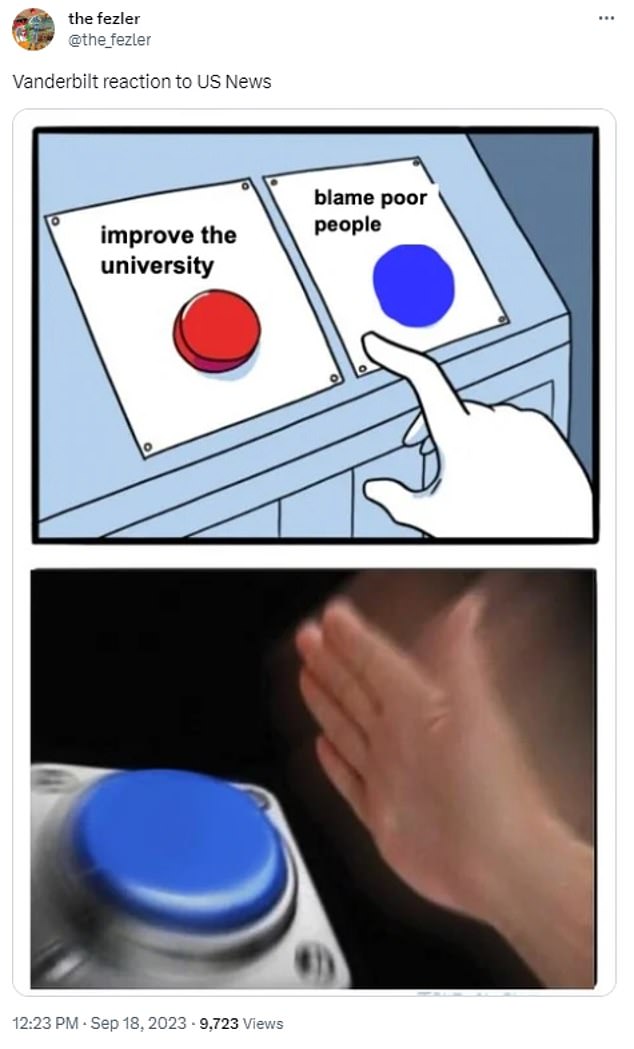
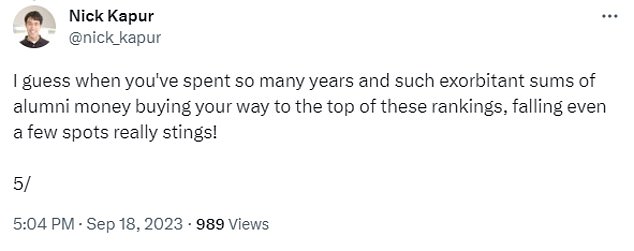
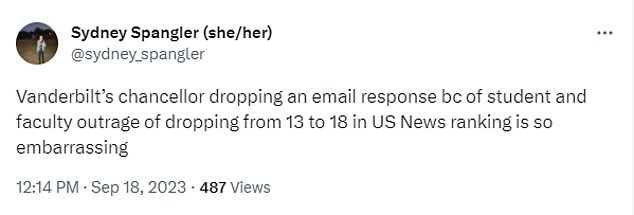
Online, people mocked Vanderbilt’s chancellor and provost’s email for complaining about changing methodology rather than making changes to accept low-income applicants.
The U.S. News and World Report’s Best Colleges Rankings is an annual report that provides prospective students with analysis of schools to help them make the right choice for their education.
The U.S. News and World News report said it made changes to the methodology to track the changing desires of prospective students.
“With college costs skyrocketing, we want to ensure that the educational resources we offer emphasize outcomes for graduates of the schools in our rankings,” said Eric Gertler, executive chairman and CEO of U.S. News.
“This, in conjunction with the other outcomes-based measures we are adopting, will further support a student’s decision-making process when making one of the most important decisions of their life.”
Yale Law School and major medical schools such as Harvard, Stanford, Columbia and the University of Pennsylvania have all dropped out of university rankings.
In June, Columbia University announced that it would withdraw from the U.S. News Report’s undergraduate student survey, citing concerns about the “inordinate influence” that rankings exert on prospective students.
Last year, Columbia came under fire after falling 16 spots on the list for reporting data incorrectly.
Before the new methodology, Yale Law withdrew from the list, saying the rankings gave more weight to schools that give aid to high test scores rather than low-income applicants.
Medical schools at Harvard, Stanford, Columbia and the University of Pennsylvania all withdrew from the rankings, saying they placed a heavy preference on the schools’ wealth and prestige.
